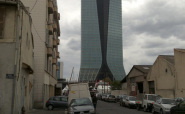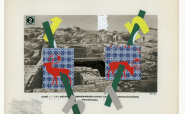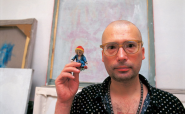| Revista Umělec 1999/1 >> Interview with Dan Merta (Secratery of the Jidřich Chalupecký Society) | Lista de todas las ediciones | ||||||||||||
|
|||||||||||||
Interview with Dan Merta (Secratery of the Jidřich Chalupecký Society)Revista Umělec 1999/101.01.1999 Lenka Lindaurová | q & a | en cs |
|||||||||||||
|
"Jindřich Chalupecký society is the organizer of the annual Jindřich Chalupecký Award, given to a young Czech artist up to 35 years of age by President Václav Havel.
You have taken charge of organizing the Jindřich Chalupecký Award in 1999. What steps are you planning so that the Award regains its prestige? On January 14, the committee of the Jindřich Chalupecký Society agreed to my proposed schedule for the Society’s activities in 1999 which were discussed during a debate in the previous issue of your magazine. The meeting also selected the Society’s working committee chaired by Jiří Šetlík, co-chaired by Tomáš Vrba, Jaroslav Kořán and Joska Skalník with me in the capacity of a secretary. The preliminary schedule for the Jindřich Chalupecký Award in 1999 will be as follows: January, February - specification of the finalists’ exhibition space (at the moment we negotiate with the National Gallery, Nová Síň Gallery and we are planning on addressing the Prague City Gallery), signing media partnership agreements (Czech Television, MF Dnes daily and arts publications); April - a press conference announcing the beginning of the competition; September 25 - a jury meeting selecting the finalists; October 20 - opening of the finalists’ exhibition; and November 20 - announcing the Award winner, presentation of the price, a press conference and an arts ball at the Palác Akropolis. These dates, however, are preliminary. The final dead-lines and the space of the exhibition will be specified and presented at the press conference in April. The main objective while trying to increase prestige of the Jindřich Chalupecký Award is to set clear rules of its organization and transparency of both the Society’s activities and the artistic jury which will be selecting the winner this year. Could you elaborate on your cooperation with media? It is necessary to sign media partnership agreements with Czech Television, MF Dnes daily and arts periodicals as soon as possible, by the end of February latest. Promotion possibilities in media are very substantial part of negotiating with potential financial partners. Should a state gallery be involved in organization of the Award? Yes, I think so. As I’ve said, we are negotiating with the National Gallery but I cannot say at the moment whether the talks will be positive for this year already. It is all depending on the internal development, strategy of the new Director General and Director of the Modern and Contemporary Art Collection. We will be speaking with other state galleries in Prague as well. Is it feasible to raise sufficient amount of funds? What is your cooperation with U.S. foundations? I will be able to answer that at the end of April. We have outlined a few potential financial partners and I believe that we will be able to cover the 1999 budget. The Society has also applied for a grant from the City of Prague. The budget includes the Award’s administration costs, exhibition of the 1998 winner at the Václav Špála Gallery, exhibition of the finalists for 1999 Award, travel and accommodation expenses of the 1998 winner in Headlands, California. The Society cooperates with the Open Society Fund in New York which covers the travel and accommodation expenses of the winners in California. I wish to extend my thanks especially to Wendy Luers. The Ministry of Culture contributes to the winner’s exhibition costs in Václav Špála Gallery. Why, do you think, isn’t this society interested in culture, let alone visual arts (by this I mean especially the more affluent people)? The conditions over the past 10 years since the Velvet Revolution have not allowed for the middle class to develop which represents the movers and shakers of the art scene. Part of the lack of interest in culture and visual arts is due to the political forces in the Czech Republic whose representatives have not at all realized what historical and cultural wealth exists in the country which could be financially utilized. Instead, they keep on pouring the tax payers’ money to factories and corporations that have for a long time been in the process of bankruptcy. If the system of write-offs and tax reductions was working here, I believe the more affluent people would take much more positive stance to culture and visual arts. Don’t you feel that the Jindřich Chalupecký Society ought to change their membership radically? The Society is considering the fact that the membership base should be increased but the Society’s board of directors will have to take a position on that. What are the possibilities of using President Havel’s name in the future Awards? President Václav Havel is one of the Society’s founders. Not as President but as citizen Václav Havel. Of course, the Award’s presentation from him in his current position is much more prestigious as he serves as the President. In a meeting with the President in April, we will discuss his involvement in the future. How do you picture the ideal course of this year’s Award? The idea is to stick to the schedule and generate substantial positive media exposure. We want to generate as much media exposure as we did in 1996 during the Award winners’ exhibition at the Prague Castle. But it is not just about exposure for the Jindřich Chalupecký Award but first of all for the winner and overall exposure of contemporary visual arts. My philosophy is that a curator or an arts historian should serve the arts, not vice versa. Who did you invite to cooperate - personalities, sponsors, media... Naturally, we cannot realize this part of the agenda alone. The Jindřich Chalupecký Society member will play an important role here and also Dana Tomášová of the Prague Castle Management will be an very special person involved in this. She cooperated with me on the 1996 exhibition and she will put in her experience with realizing cultural projects of this type. "
01.01.1999
Artículos recomendados
|
|||||||||||||





Comentarios
Actualmente no hay comentariosAgregar nuevo comentario